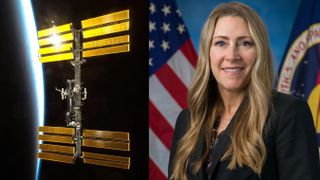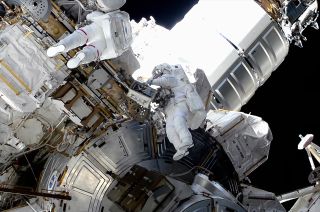
NASA’s Dana Weigel (right) will be program manager for the International Space Station (visible at left).
(Image credit: NASA)
Dana Weigel, the first woman to helm the International Space Station program manager, says she’s excited to oversee so much commercial space activity on the orbiting complex.
Weigel officially took helm of the International Space Station (ISS) program manager position on Sunday (April 7), succeeding Joel Montalbano. She was previously deputy ISS program manager and has 20 years of experience in numerous high-profile NASA roles.
Working directly alongside Montalbano in management since 2021, she said, “I’ve gotten a lot of experience with the challenges that are there,” Weigel told Space.com on March 28, including working with other agencies or answering questions for the U.S. State Department.
She praised Montalbano’s mastery of international partner relationships, including spending lengthy stays at other nations to learn the culture and norms, saying she wants to do the same. (Montalbano, for his part, was promoted to deputy associate administrator of space operations on April 7.)
Related: NASA’s Dana Weigel will be the 1st female ISS program manager
The ISS program manager position has existed since 1994, and the first pieces of the orbiting complex flew to orbit in 1998. Weigel has seen the ISS through much of that history, as flight director (2004 to 2014), deputy chief of the flight director office (2012 to 2014) and manager of the space station vehicle office (2014 to 2021), prior to becoming ISS deputy program manager and now ISS program manager.
Weigel said her job is supported by a “really interesting, diverse team that spans across the globe (and) across multiple NASA centers here in the U.S.”, focused on matters such as “breadth of of coaching and mentoring and things to pass on to newer generations.”
Breaking space news, the latest updates on rocket launches, skywatching events and more!
That large team is also very busy, she noted. As one example: The ISS hosted 40 “dynamic operations” in 2023: that means dockings, berthings, spacewalks and similar activities. And even more activities are happening with the program in the coming years.

NASA astronauts Jasmin Moghbeli (at left, in the spacesuit with red stripes) and Loral O’Hara are seen working outside of the International Space Station during the fourth-ever all-female spacewalk on Wednesday, Nov. 1, 2023. (Image credit: NASA TV)
Recently, the ISS has swiftly grown into a commercial hub, and it’s getting busier by the month. SpaceX regularly flies astronauts to the orbiting complex, while Boeing Starliner is expected to do the same no earlier than May. Aside from the long-term commercial crew missions these companies execute on behalf of NASA for six months each, Axiom Space runs half-month private missions on SpaceX to the ISS as well. Cargo is flown from the U.S. aboard SpaceX, and Sierra Space’s Dream Chaser may run its first demo flight with cargo as soon as June.
“The top priority is to be able to safely and successfully execute all of those really complex missions,” Weigel said of her focus. Aside from safety, however, the ISS will play a key support in the Artemis program to bring astronauts to the moon later in the decade, such as testing spacesuits and “de-risking” critical technologies for future missions such as life support systems.
This commercial launch activity is all aside from the hundreds of commercial experiments that run on board the ISS. “There are hundreds and hundreds of publications,” Weigel said, referring to peer-reviewed research — a metric of effectiveness in the science community. To name just one example, she said artificial retinas are being manufactured in space right now on board ISS.
The ISS partnership is currently expected to last until 2030, with Russia (under fire for its ongoing war in Ukraine) expected to step aside as soon as 2028. NASA is in the early stages of funding a set of commercial space stations that will take over the research. At this early date, it is hard to say if those space stations will be ready by decade’s end. Weigel, meanwhile, is focused on smoothing the transition as much as possible. Private astronaut missions with Axiom are a start, she said, as well as the commercial science missions.
“There’s a lot of exploratory early development work we’re doing to apply research and manufacturing on board to see what might make sense as a business case, or something that would help commercial business cases, but also have returned benefit on the grounds,” Weigel said.
Join our Space Forums to keep talking space on the latest missions, night sky and more! And if you have a news tip, correction or comment, let us know at: [email protected].
Elizabeth Howell (she/her), Ph.D., is a staff writer in the spaceflight channel since 2022 covering diversity, education and gaming as well. She was contributing writer for Space.com for 10 years before joining full-time. Elizabeth’s reporting includes multiple exclusives with the White House and Office of the Vice-President of the United States, an exclusive conversation with aspiring space tourist (and NSYNC bassist) Lance Bass, speaking several times with the International Space Station, witnessing five human spaceflight launches on two continents, flying parabolic, working inside a spacesuit, and participating in a simulated Mars mission. Her latest book, “Why Am I Taller?”, is co-written with astronaut Dave Williams. Elizabeth holds a Ph.D. and M.Sc. in Space Studies from the University of North Dakota, a Bachelor of Journalism from Canada’s Carleton University and a Bachelor of History from Canada’s Athabasca University. Elizabeth is also a post-secondary instructor in communications and science at several institutions since 2015; her experience includes developing and teaching an astronomy course at Canada’s Algonquin College (with Indigenous content as well) to more than 1,000 students since 2020. Elizabeth first got interested in space after watching the movie Apollo 13 in 1996, and still wants to be an astronaut someday. Mastodon: https://qoto.org/@howellspace
>>> Read full article>>>
Copyright for syndicated content belongs to the linked Source : Space.com – https://www.space.com/1st-female-iss-program-manager-spaceships-space-stations










